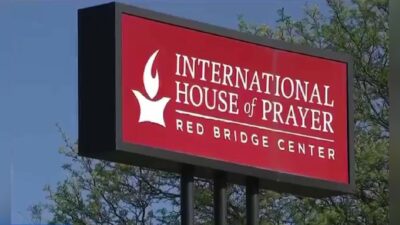Pastors at the scandal-ridden Hillsong Church lived lavishly on congregants’ tithe money, according to former Hillsong members and staff who spoke recently with the New York Post.
The church provided pastors and staff with pre-paid expense cards that they used to buy whatever they wanted—from designer purses to Manhattan hotel stays to huge quantities of food, the sources said.
Former Hillsong LA service pastor Nicole Herman told the Post that she personally loaded the funds onto expense cards for Hillsong pastors, including former Hillsong NYC Pastor Carl Lentz, who recently was fired from the church for an adulterous affair. Herman said the cards were also given to volunteers to make purchases for the church and its pastors.
According to Herman, all the money loaded onto the cards came from church donations and was refilled through her former husband who was the CFO of Hillsong LA.
The Roys Report reached out to Hillsong Church for comment, but the church did not respond.
Your tax-deductible gift helps our journalists report the truth and hold Christian leaders and organizations accountable. Give a gift of $30 or more to The Roys Report this month, and you will receive a copy of “Hurt and Healed by the Church” by Ryan George. To donate, click here.
Another former Hillsong congregant who spoke with the Post was 27-year-old Jenna Babbitt, who started attending Hillsong NYC in August 2011. Babbitt said she worked as a nanny for several Hillsong pastors, including Reed and Jess Bogard who unexpectedly resigned from Hillsong Dallas earlier this month.

Babbitt said she was given access to a pre-paid card to buy food for the children she babysat. She added that she and other volunteers also used the cards to buy spreads of food for the pastors before every service. The cards were also used to buy luxury presents and meals from upscale restaurants for visiting pastors, she said.
According to Babbitt, the church never required her to reconcile the purchases she made with the card, nor was there an expectation that the pastors would reimburse the church for personal purchases made with the card.
During the six years she attended the church, Babbitt said she donated thousands of dollars to Hillsong and worked without pay, even though she was poor at the time.
“The exploitation of free labor while these pastors are making bank is just crazy to me,” Babbitt told the Post. (In a podcast released earlier this month, former Hillsong member Janis Lagata recounted a similar experience.)
Another Hillsong NYC member who worked as a nanny for Hillsong pastors is former member Megan Phalon. Phalon told the Post that she began attending, volunteering and tithing to the church in 2011 and began baby-sitting for Pastors Kane and Karla Keatinge about a year later.
Phalon said she also was given a pre-paid card with the instructions to explicitly use it for the Keatinge’s kids, not herself.
Phalon said Keatinge was required to report his expenditures to Reed Bogard each month, but could never remember what the receipts were for. According to Phalon, the receipts included “hundreds” of purchases from restaurants, $700 for a new iPhone, and four-wheeler ATVs the pastors would drive around Williamsburg, a pricey neighborhood in Brooklyn where all the Hillsong NYC pastors lived.

Similarly, Brandon Walker, a 28-year-old who helped the Bogards start a Hillsong branch in Dallas, spoke of the lavish lifestyle Hillsong pastors lived.
Walker told the Post he remembered “a lot of eating out” and renting “very nice Airbnbs,” including one that cost $1,100/night. Walker added that Hillsong kept the finances secret because the expenditures were so excessive.
Walker said Reed Bogard once gave him $600 when he needed money. “That’s a tactic a lot of these pastors use to keep their secrets,” Walker told the Post. “Buying us expensive gifts, giving us money, like, ‘I got your back, so when I need you to have my back, this is something to remember.'”
I reached out to Reed Bogard for comment, but he did not respond by time of publishing. The Post said it also reached out to the Bogards, but the couple responded by blocking the Post reporter on Instagram.
Hillsong is reportedly investigating its East Coast branch, following the scandal involving Lentz.
Phalon said she shared details of her experience with investigation lawyers who “were shocked” by what she shared. Lawyers also reportedly contacted Babbitt, asking about the church’s use of expense cards.




















43 Responses
I’m shocked! SHOCKED! – Okay, I’m not that’s shocked.
I am not against tithing or making offerings as such, however, I am definitely confused and do not trust that congregations are not being abused of their income by twisting scripture out of context in both subtle and definite ways. I have read that the first tithe was made by Abram? voluntarily from proceeds of war to thank God for victory and blessings etc., completely voluntary. No compulsion. Then later tithe was recommended before they passed into the promised land. That was when they were under the Old Testament ‘Law’. I thought Jesus’ atonement sacrifice meant we were no longer under the Law anymore? Nevertheless, Church seem to pick and choose what bits they want to, especially when it comes to money – and there is BIG money to be made by various pastors and their wives, I have heard, who are also salaried and expensed! Often members are made to feel guilty and told they are robbing God, and that the money is not yours anyway. Seems very coercive/emotional blackmail to me. In the Old Test. tithe was to feed the people and the poor and to strengthen each other in God, so there be no poor among them, and some was for the Levites who were religious administrators for them to be sustained, who had not been allocated an inheritance by God. It was food/grain/wine offering, not money. We are not under the old law and there are no levites anymore, but we see countless examples of incredibly well remunerated Pastors (nothing humble there) with numerous flashy homes, flashy locations, flashy holidays, very nice clothes, able to afford nannies, cleaners etc. etc. Whilst their own congregation sometimes suffer in poverty. And don’t tell me God has blessed them. They are blessing themselves here. If you have already accumulated massive wealth of course it is easy for pastors to pay tithe, they have made a fortune from religion. We all have to work, why are they entitled to reward themselves in such a way? Rarely, if at all, do you see how tithe or church accounts are allocated. Many churches build big buildings and sit on billions and invest the money (know one church bought supermarket chains). It is not good enough to say, don’t worry, they will have to answer to God and it is a matter between the giver and God only. Where is the honesty in this life. I need decent answers and nobody in any church has yet to avail me of one. Anyone can set up a church/charity, that is the worrying thing. I am not saying don’t give, because clearly God wants us to be kind and generous and we need money to run services and outreach projects, but in my heart, it should not be for lavish lifestyle of pastors and worry people are being “guilted” and preyed upon. I do understand the principle of Christians working the vineyard and being the hands and feet and serving God, but something doesn’t add up or feel right, especially when asked what would I give up for God, would I give up everything to serve him, he has bought me at a price. I thought salvation was a gift. It is strange how leaders move from it being a free gift subtly towards the need to sacrifice everything about your life including your money. I want to trust, but find it almost uncomfortable. I have been encourage to tithe or make offerings even though I do not have a job, when I said I wanted a husband, I was asked do I tithe, when I said I am not currently earning but using savings, I was encouraged to make an offering, as if somehow my heart’s desire is linked to money. Confused.
Check out our YouTube site Bobby Faulkner we have exposed Carl Lentz and many others
Sounds very similar to another pastor and church we know from the Chicago area in days past.
Can we finally just call these people out before their deeds are exposed and good people question their faith? I think any discerning mind knew Lentz was a wolf years ago but in typical Christian speak anyone that called him a heretic was met with “you don’t know his heart, only God does.” We’re told to be “wise as serpents and harmless as doves” but the church has twisted that to “wise as doves and harmless as serpents.” We’ve been gaslighted by these wolves (not just Lentz) for a very long time. When you’re more concerned about posting pictures of yourself looking fit and fab on your social media accounts than you are about the lost, I call wolf. We’re not here to judge souls but we are here to judge fruit. Lentz is rotten and so is the rest of Hillsong. We’ve got to stop giving them a pass because “someone might hear something that causes them to commit their lives to Christ.” That’s the goal but for every one person that hears, one hundred people swear off the church when these charlatans are exposed. God will save people regardless of Lentz but lets stop calling these people Christians just because they have the title of “pastor.”
Excellent comments, EW66. “Either make the tree good and its fruit good, or make the tree bad and its fruit bad.”
Well when u use volunteer “service pastors” to work up the crowd u can b sure it’s a bastardized western gospel…
https://hillsong.com/collected/blog/2016/06/4-primary-roles-of-a-service-pastor/#.YBMRArU8LYU
Thank you, TJ James. I was actually wondering what a “service pastor” was. Now I know.
I’m glad to hear that these Hollywood style bad apple pastors are being revealed one at a time. In some cases by now, a box at a time. Praise God for the people that have the courage and integrity to stand up for what they know is absolutely wrong. (God Bless You Nanny’s). These wolves need to be stripped of their sheep coats. It’s obvious that Romans 12:2 has never applied to them up to this point, but I’m hoping that it might still happen in the future. Repentance is met with God’s GRACE and FORGIVNESS. WOW!! that is absolutely mind boggling. However, repentance is not just a slowing down or cutting back of luxurious lavish living on the church’s dime, but a complete turn around of life style. 180 degrees.
“During the six years she attended the church, Babbitt said she donated thousands of dollars to Hillsong and worked without pay, even though she was poor at the time.”
Was she living at home with her parents, or did she have a job to pay her rent and buy groceries as well as nannying without pay?
Wow! We will all give an account on the judgement day
Even if a pastor inherits wealth, he should have the common sense to live a modest lifestyle. He should be more interested in being a huge giver than being a big taker. Church leaders should have the sense to compensate their pastors fairly, but not lavishly. In fact, if necessary, church leaders should warn pastors not to live lavish lifestyles–even if they have invested well and can afford to do so. Perhaps some of the board members are willing to overlook such largesse because they live an ostentatious lifestyle. I’m not opposed to rich Christians, and I understand that some positions may seem to require excessive spending on “things.” However, rich Christians would be better respected for their generosity, and no pastor should believe that he is entitled to all perks of the rich and famous. On the other side of the coin, most pastors are under-paid and over-worked. Church leaders should be even more concerned about that fact. The old saw of “The Lord will keep him humble, and we will keep him poor” should not be true of any church family.
NONE of the pastors I’ve ever known, and I’ve known plenty, have even been underpaid, and certainly never overworked. Maybe I just know the wrong people. But the ones I know have a huge staff of paid employees and also volunteers to do the work of the church. I know pastors who have it in their contract that they will not do hospital visits, home visits, weddings, or funerals. Every pastor and church staff I know are able to take off when their children are sick or have a school play, or if they themselves are sick. Pre virus that is. They work 40 hrs a week if that. They take days off to prepare the sermon that sometimes ends up being canned anyway. They go to conferences and retreats (VACATIONS) on God’s and the people’s dime. Eat out for “meetings”. Woo potential church members at lunches and dinners. Versus most church volunteers who put in a 40+ hr work week and have a family AND do the work of the church while living life in the margins and maybe getting to go on a small yearly vacation they have scrimped and done without for. I will NEVER give money to another church again. I help people directly and that’s so much more satisfying and pleasing to the Lord anyway. Woe to these evil shepherds.
You must be running in the wrong circles — find a solid smaller church to get involved with. Most of the pastors I know make the average for their communities, if not less. On the clock 24/7 to serve the Lord’s people and His church. Sure there can also be problems in the smaller church, but better connected to have first hand information and connect. I know pastors who have faithfully served in the hills of Appalachia barely surviving in a church of 40-60 dealing with addictions, and abuse, etc., running the church van to pick up people, and on and on. Many individuals are drawn to the large megas and too often there is the CEO mentality. The vast majority of smaller churches are served by pastor-shepherds who understand the church belongs to Jesus and they are merely undershepeherds (1 Pet. 5:1-3).
Why do you give them money?
To my brothers and sisters in Christ who are new converts to faith in Christ: any time you hear the words “mega” and “celebrity” to describe a church or a pastor, RUN!
You’re exactly right. RUN!
I am sooo surprised. Not. Hillsong sucks. Their theology sucks, their music REALLY sucks, and most of all their conduct and fruits (or lack thereof on the latter) suck. I’m glad Ms. Babbitt saw the light and didn’t give her life for this greedy and self-deifying cult the way another Babbitt (Ashli) did for her cult.
Just finished “Wild, Wild Country” on Netflix and parallels with these entertainment conglomerates are interesting. Money, sex, and power.
Yeah that was a great Netflix series. Watching it, I wandered who in their right mind would join such a group. But then again, I read many of the stories that Julie presents and continue to be amazed at how many high functioning adults ignore common sense and ruthlessly defend the leaders they follow. Consider what is known about Harvest today and then look back at how many defended James MacDonald in spite of the harm he caused at the time. It’s unfortunate that nobody has walked back their comments to bring some sort of repair.
This isn’t the last time we’ll see stories about predatory leaders. It is interesting to see the cycle repeat itself and then see observers respond as if they are surprised.
Some think that, in Luke 21, Jesus is praising the widow for giving all she had. Instead, I really think He is rebuking the Pharisees for manipulating her to give them everything she had. Then, Jesus says she is left with nothing to live on while they exploit her offerings for their own selfish gain. Like them, it’s painful to see Hillsong exploiting their own. I would be gone in a heartbeat.
Jesus actually commends here for what she did in 21:3-4. That doesn’t excuse the Pharisees and Jesus had much to condemn them for and did. We don’t want to lose the importance of her generosity and heart which Jesus commends which is recorded to challenge us about our own focus on “mammom.”
Jesus was praising the widow. She was giving from the abundance of her heart while others gave from the abundance of their wealth. She gave until it hurt while others who had much more than she gave and still had much left. This passage has nothing to do with the Pharisees.
Concern #1 | This guy maintains a very high standard of living. Something isn’t adding up.
Concern #2 | I don’t believe in reincarnation, but man this guy bears a striking resemblance to David Koresh
Concern #3 | With this guy you get nothing in return for your donations, but by giving your money to Jim Baker at least gets you a bucket of beef jerky and pancakes that will last at least 7 or 8 years
Don’t believe in reincarnation?
Well I hope not. Neither did demons that possessed that man in Matthew 8:29 “ And they cried out, saying, “What business do You have with us, Son of God? Have You come here to torment us before the time?” (NASB). What….time? That great time of….cyclic reincarnation? Obviously no. Judgment Day. The devil and his demons know there is a time when they will be judged. Judgment Day.
Uwe
(Jude 1:3)
Post Tenebras Lux
UWE -Can you expound a bit? I don’t see where you are going with your response. I’m not necessarily in disagreement, it’s just that I don’t understand.
In my comment I’m injecting a bit of humor to bring a bit of levity to an absurd and disappointing story. Like I said, I’m not a believer in reincarnation but it is funny that the Hillsong pastor looks a lot like cult leader David Koresh.
With or without the eloquent biblical references, the exploitation of the Hillsong congregation is simply wrong.
Were any of the hundreds of thousands who attended Hillsong ever presented with the real Christ…the Saving Jesus by these serpents? Highly doubtful that any of these grifters did so then these folk are still dead in their sins unless,of course, one is saved by good intentions.
In fact of all who profess Christ, what Christ do they profess? A false one or the Saving One?
Spiritual Roulette…where does the ball land?
Sounds like a Christless Christianity. Read the book “Christless Christianity: The Alternative Gospel of the American Church” by Michael Horton, founder of “Modern Reformation” and The White Horse Inn radio program and “Core Christianity”.
Uwe
(Jude 1:3)
Post Tenebras Lux
What will it take to expose the Houstons at their naked worst, and cut them where it hurts? That’ll be the only way to drain the swamp of ministry by “Mend of Gawd”.
“ What will it take to expose the Houstons at their naked worst, and cut them where it hurts? That’ll be the only way to drain the swamp of ministry by “Mend of Gawd”.”
Easy; read the entire Book of Jude (only 25 verses…..POWERFUL verses).
1 Thes 5:21, 2 Tim 4:1-5
Uwe
(Jude 1:3)
Post Tenebras Lux
The fallacy of assumption. Just because some people call themselves “pastors”, and by their followers, it doesn’t make them ministers of God. Charles Taze Russell was never ordained by any ministry, never attended any Bible college, did not obtain a degree, was not a theologian, did not know the languages of the Bible, Hebrew, Aramaic, Koine Greek. Yet he wrote a volume set called “Millennial Dawn”….which he later changed the title to “Studies In The Scriptures”. He claimed that without going through his “knowledge” of the Bible and his teachings, anyone reading the Bible would be lost. People today would say that no fool would follow such a charlatan. Well, those that follow his teachings are better known today as Jehovah’s Witnesses.
Uwe
(Jude 1:3)
Post Tenebras Lux
Julie thanks for the coverage.
Hillsong was originally part of the Assemblies of God of Australia, now known as the Australian Christian Churches. Denominations of long standing have systems of accountability in place. The AG requires functioning deacon boards elected by the members. The local church calls the pastor, affirming the call with a congregational vote. The regional level of the denomination may be called in to evaluate or investigate pastors. Local congregations can vote a pastor out. Regional Presbyters can de-certify a pastor disqualifying him for his pastorate. The short of it is there is both internal accountability (deacon board) and external accountability (denominational). So frequently Evangelical churches that go independent due so to avoid accountability. I don’t mean to disparage independent churches that do a good job. When you see a church under fire, and they have to call in a team of celebrity ministers or some distinguished group of outside people to investigate, it is a clear sign that the external accountability piece is missing.
So, I think there is an important lesson here. Do not join a church only because you like the preaching and music on Sunday and the folks are friendly or they have a dynamic youth group. These are important, but do some due diligence. Look at the Constitution and bylaws of the local church. Does the board membership consist of the pastor’s wife, daughter, and son-in-law? Is this board also the legal entity that owns the building? Are the books open to members and attendees? Is a member allowed to know the salary for the pastor and staff? Are there regular business meetings with a report to the congregation? Are accounts audited? Does the church regularly support long term missionaries or do they just do expensive short-term work that is more like a vacation? Also take a close look at staff turnover. If there is a great deal of staff turnover, it may be a sign that something is amiss. Weigh both the heart and head. If a church is unwilling to answer these questions, keep praying and look for another congregation.
It is spiritual to understand the structures of accountability in your local church. When you attend a church with Biblical, rational structures of accountability, you can give generously, serve securely, and sleep well at night.
Those are some very good points. I am saddened to hear of individuals who have decided to leave church because of some bad experiences. The local church is God’s idea, the epistles of the New Testament were written to local churches. It is in the context of a local church that one truly grows in Christ. Sure, there are problems in the local church and they need to be addressed but there are also great blessings. The real local church is made up of sinners who are saved by God’s grace and seek to live out the Gospel to infect the community around them. Some local churches are disfunctional – just like there are human families. But the local church is God’s idea. Sometimes great blessing and sometimes great hurt.
Hi Don
You write…
“But the local church is God’s idea.”
But “local church, “ is NOT mentioned in the Bible.
Response to “local church” is NOT mentioned in the Bible.
“Local churches” are assemblies or groups of believers in Christ who meet together regularly and share their lives together in a particular locale, e.g. the seven churches in Asia Minor (Rev 1:4), the churches in Galatia (1 Cor 16:9, Gal 1:2), churches of Macedonia (2 Cor 8:1); church in Judea, Galilee, and Samaria (Ac 9:31); church at Antioch (Ac 11:36), etc. The idea of locale is actually broader than just geography and also embraces the idea of different cultures, language, and customs particular to an area. We can see this idea in the differences in practice in the dominantly Jewish Christian churches and majority Gentile churches. (Ac 21) Bible writers understood differences in culture, customs, and language.
The word “church” is used with some other nuances in specific contexts, but these aren’t at issue here. The adjective “local” is used to flesh out one of the nuances of meaning of the Greek word for “church” in English. Remember “church” doesn’t appear in the New Testament either. It is a word selected from English with the closest meaning to the Bible term. The term assembly or congregation could have also been used. Qualifications for words (adjectives) are often needed when translating from one language to another and for the purpose of discussion and teaching..
When Paul writes to the “churches at Galatia,” he means the churches in that geographical locale that share similar customs, language, and culture.
But, maybe I missed it…
If there really is a Local Church?
Which one is recommended for WE, His Sheep?
Let’s see…. Today…
WE, His Disciples, have lots to choose from…
There are thousands of denominations…
WE, His Ekklesia, can choose from…
The Orthodox Local Church,
The Greek Orthodox Local Church,
The Eastern Orthodox Local Church,
The Russian Orthodox Local Church,
The Liturgical Local Church,
The Traditional Local Church,
The Institutional Local Church,
The Religious System Local Church,
The Steeple $ Corporation Local Church,
The 501(c) 3, non profit, tax deductible,
Religious $ Corporation, the IRS calls Church,
The Brick and Mortar Local Church,
The Pastor Led Local Church,
The Multiple Elder Led Local Church,
The Congregational Led Local Church,
The Pope Led Local Church,
The Bishop Led Local Church,
The “Chief Executive Apostle” Led Local Church,
There really is a Chief Executive Apostle
No Kidding. Saw him with my own eyes. ;-)
The Solid Local Church,
The Fluid Local Church,
The House Local Church,
The Simple Local Church,
The Organic Local Church,
The Institutional Local Church,
Oh, I said that one already. ;-)
The Small Group Local Church,
The Denominational Local Church,
The Non – Denominational Local Church,
The Inter – Denominational Local Church,
The Intra – Denominational Local Church,
The Underground Local Church,
The Full Gospel Local Church,
The Mega Local Church,
The Baptist Local Church,
The Lutheran Local Church,
The Evangelical Local Church,
The Charis maniacle ism Local Church,
The “Pente” – it’s going to – “cost”- you – “a Lot ism” Local Chuch,
——-
Hmmm?
Is God confused??? Or sumptin??? ;-)
Did God start ALL these “ Local Churches?”
And, none of them are working very well. Oy Vey!!! :-(
The Folks, believers, are leaving “Today’s “Corrupt Religious Systems?”
In droves.
Spot on! Good, healthy systems of accountability are absolutely essential for a healthy church. I think that Christians who truly view Christ as King of the church understand their own role in the body and will work toward healthy systems of accountability. I’m afraid our culture today likes to make “kings” of people who aren’t Christ and this culture invades the church as well. People look to their pastor for the things they should be looking to Christ for.
I’d like to hear more of your thoughts ???? n this. Any good books to read about healthy church organizational systems?
Response: Healthy Church organizations. Further Reading.
The NT, unlike the OT, is somewhat vague on the specifics of church organization. We know they had regular administration of churches via elders and deacons. They also had charismatically gifted leaders. Peter is an Elder and an Apostle. On the other hand, local churches did seem to have a lot of autonomy. Paul was treated pretty badly in 2 Corinthians with the church drifting to follow tall-tale preachers. The Apostle John’s emissary was locked out of the church by a local leader in 3 John. The Apostles were not lords over the churches. But the general principle is that there was external and internal authority and accountability. The Jerusalem Council of Acts 15 reveals elders share leadership with the apostles, and decision is made by vote. The decision is delivered to all the churches. Paul consults key elder leadership at Jerusalem in Galatians 1 for affirmation of his ministry. There are so many indicators of internal and external checks.
I think God left the specific structures of the early church organization vague on purpose. The gospel was geared to reach all nations, tribes, and tongues. Hence, the organizational structure was destined to look and run a little differently everywhere. The principles of internal and external accountability have to be fleshed out in the cultural and legal context of the specific culture. By the 2nd and 3rd century, it seems the churches adopted a Roman style hierarchy. The pastor with a multi-campus congregation became a bishop, overseeing all the churches in his locale. Regional bishops held conferences and conferred with each other. Later, during the Reformation, the Anabaptists pressed for more local congregational autonomy. In our modern democracies, we have more democratically styled systems of accountability. Even the most historically rigid hierarchical styled leadership Church groups, e.g. Roman Catholic, have relinquished authority down the chain-of-command. And the most rigidly autonomous Churches and groups, e.g. Southern Baptists, have seen the need for increased external authority in the wake of sex abuse scandals.
A good read to get the lay of the land:
https://www.christianbook.com/perspectives-church-government-five-views-polity/9780805425901/pd/25906?event=ESRCG
It does have a bias in favor congregational order, but other viewpoints freely present their case.
This article begins…
“Pastors at the scandal-ridden Hillsong Church lived lavishly on congregants’ tithe money…”
NOPE…
In The Bible, the TITHE was NEVER Silver, Gold, or MONEY.
The TITHE was always agricultural. Food to be eaten…
Or sacrificed to God by the Levitical Priests.
Except when Abraham gave a TITHE, a tenth, ONCE…
Of The Spoils of War, to Melchisedec, King of Peace…
After slaughtering a bunch of kings.
Tithe means, a tenth, 10%.
Seems, when you search the scriptures, OT and NT…
“The Tithe,” was NEVER from “wages.”
“The Tithe,” was NEVER “MONEY.” Or silver. Or gold.
“The Tithe,” was NEVER given to a “local church.”
With all the instructions Paul gives to WE, His Ekklesia, His Church…
….. Paul did NOT teach WE, His Disciples, His Sheep, His Servants…
….. To tithe? Give 10%? From wages? MONEY? To a “local church?”
The Jerusalem council in Acts 15, did NOT teach the new gentile believers…
….. To tithe? Give 10%? From wages? MONEY? To a “local church?”
Matthew, Mark, Luke, John, Timothy, James and Jesus, did NOT teach believers…
….. To tithe? Give 10%? From wages? MONEY? To a “local church?”
Seems, in the Bible, if you are one of **His Disciples,** His Sheep…
“…giving the first tenth of your entire **wages** to your local church.”
Is NOT required…
What is popular is NOT always “Truth.”
What is “Truth” is NOT always popular.
Does anyone understand the significance of pre-loaded spending cards? Was this a way to avoid accountability? I don’t know – just wondering.
Question: Preloaded credit card.
A pre-loaded credit card is like a gift card or a debit card. It has a certain limit. When the limit is reached, it has to be re-loaded with funds. Prior to these kinds of cards, organizations had “petty cash.” It was usually a box in a file cabinet with a specific amount of cash that could be used for small purchases. The benefit of petty cash or pre-loaded cards is that they allow people to make small purchases. They reduce red tape and the need to constantly get someone’s approval for small, routine purchases. In the petty cash days, people kept a log and receipts to track expenses. In the credit card world, the bank produces a receipt for purchases in addition to any physical purchase receipts. The problem with a pre-loaded card is when it truly does function like a gift card, especially with an extremely high load and no oversight over its use.
See the key line: “According to Babbitt, the church never required her to reconcile the purchases she made with the card, nor was there an expectation that the pastors would reimburse the church for personal purchases made with the card.”
Alas. In the end, there is always the human element. The best system can be abused without proper human oversight. Routine external audits will catch most of these financial abuses. The risk to the church is significant. If designated donations are not used according to the intent of the giver or if money is being stolen both IRS action and prosecution of individuals may follow. The IRS can withdraw the church tax exempt status. In some instances, people with oversight can even be personally sued if they have acted with bad faith or performed willful misconduct. From my observation over the years, it seems the two biggest reasons pastors and church leaders go to jail are financial misconduct or sexual abuse.
Julie might even have some statistics on this.
“She added that she and other volunteers also used the cards to buy spreads of food for the pastors before every service.”
In my former life, this is what we called the ‘rider’. When a band goes on tour their tour manager usually sends out what’s called a rider to each venue in advance of the performance, listing what the band requires backstage.
Now we have ‘pastors’ (?) who behave and live like they are the rock stars. SMH.